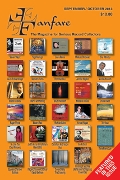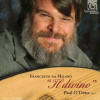Texte paru dans: / Appeared in:

Fanfare Magazine: 37:1 (09-10/2013)
Pour
s'abonner / Subscription information
Les abonnés à Fanfare Magazine ont accès aux archives du
magazine sur internet.
Subscribers to Fanfare Magazine have access to the archives of the magazine
on the net.
Harmonia Mundi
HMU907557

Paul O’Dette quotes Martin Luther on Josquin, in referring to Francesco: “Josquin is the master of the notes, which must do as he wishes; other composers must follow what the notes dictate.” It’s a fair assessment. The lute music of Francesco Canova (1497-1543; sometimes called Francesco da Milano, Francesco Milanese, Francesco da Parigi, Francesco di Monzino, or simply “Il Divino”) gives an impression of artless achievement. Its frequently elaborate counterpoint seems to simply fall into place, without ever obscuring textural clarity. Similarly, Francesco has a way of taking popular themes such as Claudin de Sermisy’s Las! Je me plains and Vignon vignette, and flowing the line of his thought easily, almost mischievously at times, around and through the melody. His short motifs lend themselves to brilliant transformation; his longer themes in slower pieces are as memorable as anything out of Dowland.
More of Francesco’s compositions have survived in period manuscripts than any of his lutenist contemporaries: roughly 140 works, over 100 described interchangeably as fantasias and ricercars, the rest being intabulations of vocal music. In modern times he’s done reasonably well on recordings, though most (if not all) take the form of a few isolated pieces in thematic collections. These include one Paul O’Dette made almost 20 years ago, Dolcissima et Amorosa—Early Italian Renaissance Music. (It now has the far more generic title Lute Music, Vol. 2, and can be purchased as Harmonia Mundi 3957043.) His approach hasn’t changed much in Francesco’s works over the years, if the few duplications between the two releases are anything to judge by. And it’s a perfect match between composer and performer, given O’Dette’s ease with this complex music, never sacrificing clarity, detail of phrasing, or tonal beauty.
I should note that one thing has changed between the two releases. While the earlier had a reasonably dry, attractive acoustic, this release is somewhat more reverberant, with more prominent bass, and a moderate amount of noise from the instrument. It’s not excessive, but it’s still there. As it isn’t a trait shared by O’Dette’s other recordings, of which I have several, I can only assume it is an unpleasant characteristic of the engineering. Not enough to warrant avoiding this album, but if you prefer your lute solos without any instrumental noise, you’ll want to sample, first. Still,
Paul O’Dette quotes Martin Luther on Josquin, in referring to Francesco: “Josquin is the master of the notes, which must do as he wishes; other composers must follow what the notes dictate.” It’s a fair assessment. The lute music of Francesco Canova (1497-1543; sometimes called Francesco da Milano, Francesco Milanese, Francesco da Parigi, Francesco di Monzino, or simply “Il Divino”) gives an impression of artless achievement. Its frequently elaborate counterpoint seems to simply fall into place, without ever obscuring textural clarity. Similarly, Francesco has a way of taking popular themes such as Claudin de Sermisy’s Las! Je me plains and Vignon vignette, and flowing the line of his thought easily, almost mischievously at times, around and through the melody. His short motifs lend themselves to brilliant transformation; his longer themes in slower pieces are as memorable as anything out of Dowland.
More of Francesco’s compositions have survived in period manuscripts than any of his lutenist contemporaries: roughly 140 works, over 100 described interchangeably as fantasias and ricercars, the rest being intabulations of vocal music. In modern times he’s done reasonably well on recordings, though most (if not all) take the form of a few isolated pieces in thematic collections. These include one Paul O’Dette made almost 20 years ago, Dolcissima et Amorosa—Early Italian Renaissance Music. (It now has the far more generic title Lute Music, Vol. 2, and can be purchased as Harmonia Mundi 3957043.) His approach hasn’t changed much in Francesco’s works over the years, if the few duplications between the two releases are anything to judge by. And it’s a perfect match between composer and performer, given O’Dette’s ease with this complex music, never sacrificing clarity, detail of phrasing, or tonal beauty.
I should note that one thing has changed between the two releases. While the earlier had a reasonably dry, attractive acoustic, this release is somewhat more reverberant, with more prominent bass, and a moderate amount of noise from the instrument. It’s not excessive, but it’s still there. As it isn’t a trait shared by O’Dette’s other recordings, of which I have several, I can only assume it is an unpleasant characteristic of the engineering. Not enough to warrant avoiding this album, but if you prefer your lute solos without any instrumental noise, you’ll want to sample, first. Still, top marks for this release.
Cliquez l'un ou l'autre
bouton pour découvrir bien d'autres critiques de CD
Click either button for many other reviews


